Top 30 Psychology Internships for International Students in the USA 2025
Introduction
The Power of Practical Experience
Imagine this: You’re an international student, passionately pursuing a psychology degree in the United States. Your mind is brimming with theories, research methodologies, and case studies. But there’s a gnawing question at the back of your mind: “How does all this translate to real-world practice?”
Enter the game-changer: internships.
These aren’t just lines on your resume; they’re your golden ticket to bridging the gap between academic knowledge and professional prowess. For psychology students, internships offer a thrilling plunge into the depths of human behavior, cognition, and mental health practices that textbooks simply can’t replicate.
Uncharted Waters: The International Student Experience
Now, let’s add another layer to this adventure. As an international student, you’re not just stepping into a new professional realm; you’re embarking on a cross-cultural odyssey. The challenges? They’re unique. The opportunities? They’re boundless.
Imagine grappling with not just the intricacies of psychological assessment but also the nuances of American workplace etiquette. It’s a double-edged sword of complexity and opportunity that can forge you into a truly global professional.
The American Psychology Landscape: A Vast Terrain of Possibilities
The United States, with its diverse population and cutting-edge research facilities, offers a psychological playground like no other. From bustling urban clinics in New York City to pioneering research labs in California, the landscape is vast and varied.
Did you know? The American Psychological Association (APA) accredits over 400 doctoral programs in psychology. Each of these programs potentially opens doors to internship opportunities, creating a rich tapestry of options for aspiring psychologists.
Whether your passion lies in clinical psychology, neuropsychology, industrial-organizational psychology, or any other subfield, the U.S. offers a smorgasbord of internship experiences. It’s a land where you can find yourself counseling at-risk youth one summer and conducting groundbreaking research on artificial intelligence and human cognition the next.
RELATED ARTICLES:
- NFL SUMMER INTERNSHIP PROGRAM 2025
- 20 BEST ENGINEERING INTERNSHIPS FOR INTERNATIONAL STUDENTS IN THE USA
- 47 BEST INTERNSHIP OPPORTUNITIES FOR INTERNATIONAL STUDENTS OFFERING COMPUTER SCIENCE IN THE USA

Understanding the Basics of Psychology Internships
Decoding the Internship Alphabet Soup
Clinical vs. Research: Two Sides of the Same Coin
Clinical Internships: These are your front-line experiences in psychology. Imagine yourself at a community mental health center, working alongside licensed psychologists to provide therapy, conduct assessments, and develop treatment plans. It’s hands-on, it’s intense, and it’s incredibly rewarding.
Research Internships: If you’re more inclined towards the scientific side of psychology, these are your playground. Picture yourself in a state-of-the-art lab at MIT, using fMRI technology to unravel the mysteries of the human brain. Or perhaps you’re at Stanford, designing experiments to understand the psychological impacts of social media.
The Hidden Gems: Niche Internships
But wait, there’s more! The psychology field is as diverse as human behavior itself. Consider these lesser-known but equally fascinating options:
- Forensic Psychology Internships: Dive into the intersection of psychology and law. You might find yourself analyzing criminal behavior patterns or assisting in jury selection.
- Sports Psychology Internships: Help athletes achieve peak performance. These internships could have you working with college sports teams or even Olympic hopefuls.
- Environmental Psychology Internships: Explore how our surroundings impact our behavior. You could be involved in designing more psychologically healthy urban spaces.
Visa Vexations
Now, let’s talk about the elephant in the room – visas. As an international student, this is crucial territory.
F-1 Visa: Your Academic Ally
If you’re studying full-time in the U.S., you’re likely on an F-1 visa. Good news! This visa allows for certain types of internship experiences:
- Curricular Practical Training (CPT): This is your go-to for internships that are an integral part of your curriculum. It’s like getting course credit for real-world experience – a win-win!
- Optional Practical Training (OPT): This golden ticket allows you to work in your field of study for up to 12 months after graduation. Pro tip: STEM fields, including some areas of psychology, may be eligible for a 24-month extension!
J-1 Visa: The Cultural Exchange Route
Some internships, especially research-based ones, might fall under the J-1 visa category. This visa is all about cultural exchange and can offer unique opportunities to immerse yourself in American academic culture.
The Million-Dollar Question: Paid vs. Unpaid Internships
Let’s talk money – or the potential lack thereof.
Paid Internships: The Ideal Scenario
Many psychology internships, especially at the graduate level, offer stipends. These can range from modest sums that cover your daily commute to more substantial amounts that can significantly offset your living expenses.
Example: The NIH Summer Internship Program in Biomedical Research offers stipends starting at $1,465 per month for undergraduates, with higher rates for more advanced students.
Unpaid Internships: A Controversial Topic
Unpaid internships are a hot-button issue in the U.S. While they can offer valuable experience, they also raise questions about accessibility and fairness. If you’re considering an unpaid internship, weigh the experience gained against the financial implications carefully.
Pro Tip: Some universities offer grants or stipends to support students in unpaid internships. Always check with your international student office for such opportunities!
Academic Credit: Turning Experience into Grades
Many psychology programs offer academic credit for internships. This can be a great way to fulfill course requirements while gaining real-world experience.
How it works:
- Enroll in an internship course at your university.
- Complete your internship hours.
- Usually, you’ll need to submit reflective essays or projects about your experience.
- Voila! You’ve earned credits and invaluable professional experience.
Remember: The specifics can vary widely between universities, so always consult with your academic advisor.
Now take a moment to reflect on the myriad of opportunities before you. Whether you’re drawn to the clinical frontlines, the research labs, or the innovative intersections of psychology with other fields, there’s an internship out there that aligns with your passions and goals.
Top 30 Psychology Internship Opportunities for International Students
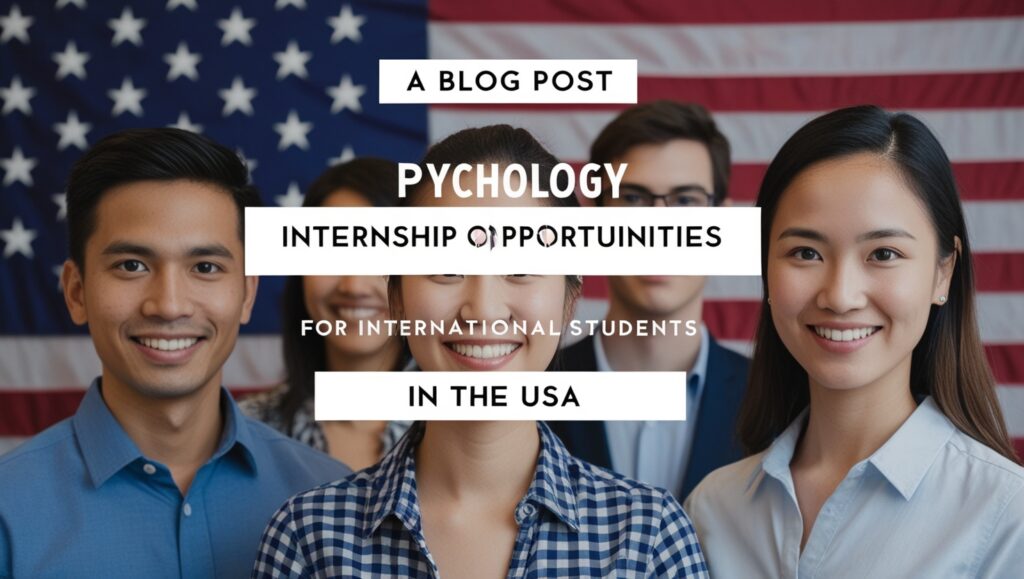
1. National Institutes of Health (NIH) – Summer Internship Program in Biomedical Research
- Program: Research in various psychology-related fields
- Requirements: Currently enrolled undergraduate or graduate student
- Duration: 8-10 weeks (summer)
- Application Timeline: November 15 – March 1
- Compensation: Stipend provided
2. American Psychological Association (APA) – Minority Fellowship Program Psychology Summer Institute
- Program: Research and professional development
- Requirements: Ethnic minority graduate students in psychology
- Duration: 1 week (summer)
- Application Timeline: January – March
- Compensation: Travel and lodging provided
3. McLean Hospital – Harvard Medical School Affiliate
- Program: Clinical psychology internship
- Requirements: Doctoral students in clinical psychology
- Duration: 12 months
- Application Timeline: November 1
- Compensation: Stipend provided
4. Yale School of Medicine – Psychology Training Program
- Program: Clinical and research training
- Requirements: Advanced graduate students in clinical psychology
- Duration: 12 months
- Application Timeline: November 1
- Compensation: Stipend provided
5. Stanford University – Summer Research Program in Psychology
- Program: Research in various psychology subfields
- Requirements: Undergraduate students with research interests
- Duration: 8-10 weeks (summer)
- Application Timeline: February 1
- Compensation: Stipend and housing provided
6. Massachusetts General Hospital – Clinical Psychology Internship
- Program: Clinical training in various specialties
- Requirements: Doctoral students in clinical psychology
- Duration: 12 months
- Application Timeline: November 1
- Compensation: Stipend provided
7. University of California, Los Angeles (UCLA) – Psychology Research Opportunity Programs
- Program: Various research projects in psychology
- Requirements: Undergraduate students
- Duration: Varies (academic year and summer options)
- Application Timeline: Varies by program
- Compensation: Some paid positions available
8. New York University (NYU) – Summer Undergraduate Research Program
- Program: Research in cognitive and social neuroscience
- Requirements: Undergraduate students with research interests
- Duration: 10 weeks (summer)
- Application Timeline: February 15
- Compensation: Stipend provided
9. Emory University – Summer Undergraduate Research Experience (SURE)
- Program: Research in various psychology fields
- Requirements: Undergraduate students
- Duration: 10 weeks (summer)
- Application Timeline: February 1
- Compensation: Stipend provided
10. Johns Hopkins University – Summer Internship Program in Biomedical Research
- Program: Research in psychology and neuroscience
- Requirements: Undergraduate students
- Duration: 10 weeks (summer)
- Application Timeline: November – January
- Compensation: Stipend provided
11. University of Michigan – Michigan Research and Discovery Scholars
- Program: Research in various psychology subfields
- Requirements: Undergraduate students
- Duration: Academic year
- Application Timeline: March 1
- Compensation: Some paid positions available
12. Vanderbilt University – Undergraduate Clinical and Translational Research Internship
- Program: Clinical research in psychology and related fields
- Requirements: Undergraduate students
- Duration: 10 weeks (summer)
- Application Timeline: February 1
- Compensation: Stipend provided
13. Columbia University – Summer Undergraduate Research Fellowship (SURF)
- Program: Research in psychology and neuroscience
- Requirements: Undergraduate students
- Duration: 10 weeks (summer)
- Application Timeline: February 1
- Compensation: Stipend provided
14. Mayo Clinic – Summer Undergraduate Research Fellowship (SURF) Program
- Program: Research in neuroscience and behavioral sciences
- Requirements: Undergraduate students
- Duration: 10 weeks (summer)
- Application Timeline: February 1
- Compensation: Stipend provided
15. University of Pennsylvania – Research Experience for Undergraduates in Psychology
- Program: Research in various psychology subfields
- Requirements: Undergraduate students
- Duration: 10 weeks (summer)
- Application Timeline: February 15
- Compensation: Stipend provided
16. Duke University – Summer Neuroscience Program
- Program: Research in neuroscience and behavior
- Requirements: Undergraduate students
- Duration: 10 weeks (summer)
- Application Timeline: February 15
- Compensation: Stipend provided
17. University of California, Berkeley – Summer Research Opportunity Program
- Program: Research in psychology and related fields
- Requirements: Undergraduate students
- Duration: 8 weeks (summer)
- Application Timeline: February 1
- Compensation: Stipend and housing provided
18. Northwestern University – Summer Research Opportunity Program
- Program: Research in psychology and cognitive science
- Requirements: Undergraduate students
- Duration: 8 weeks (summer)
- Application Timeline: February 15
- Compensation: Stipend and housing provided
19. Boston University – Research in Science & Engineering (RISE) Internship Program
- Program: Research in psychology and neuroscience
- Requirements: Undergraduate students
- Duration: 10 weeks (summer)
- Application Timeline: February 15
- Compensation: Stipend provided
20. University of Washington – Psychology Research Experience Program (PREP)
- Program: Research in various psychology subfields
- Requirements: Undergraduate students
- Duration: Academic year
- Application Timeline: Ongoing
- Compensation: Academic credit
21. Rutgers University – Aresty Research Assistant Program
- Program: Research in psychology and cognitive science
- Requirements: Undergraduate students
- Duration: Academic year
- Application Timeline: September (for fall), January (for spring)
- Compensation: Stipend provided
22. University of Texas at Austin – Research Experience for Undergraduates in Psychology
- Program: Research in various psychology subfields
- Requirements: Undergraduate students
- Duration: 10 weeks (summer)
- Application Timeline: February 15
- Compensation: Stipend provided
23. Carnegie Mellon University – Summer Undergraduate Research Fellowship (SURF)
- Program: Research in psychology and cognitive science
- Requirements: Undergraduate students
- Duration: 10 weeks (summer)
- Application Timeline: January 31
- Compensation: Stipend provided
24. University of Minnesota – Life Sciences Summer Undergraduate Research Program (LSSURP)
- Program: Research in behavioral neuroscience and psychology
- Requirements: Undergraduate students
- Duration: 10 weeks (summer)
- Application Timeline: February 15
- Compensation: Stipend and housing provided
25. Icahn School of Medicine at Mount Sinai – Summer Undergraduate Research Program
- Program: Research in neuroscience and psychiatric disorders
- Requirements: Undergraduate students
- Duration: 10 weeks (summer)
- Application Timeline: February 1
- Compensation: Stipend provided
26. University of Colorado Boulder – Summer Research Programs
- Program: Research in various psychology subfields
- Requirements: Undergraduate students
- Duration: 8-10 weeks (summer)
- Application Timeline: February 15
- Compensation: Stipend provided
27. Ohio State University – Summer Research Opportunities Program
- Program: Research in psychology and related fields
- Requirements: Undergraduate students
- Duration: 8 weeks (summer)
- Application Timeline: February 10
- Compensation: Stipend and housing provided
28. University of Illinois at Urbana-Champaign – Summer Research Opportunities Program
- Program: Research in psychology and cognitive science
- Requirements: Undergraduate students
- Duration: 10 weeks (summer)
- Application Timeline: February 15
- Compensation: Stipend and housing provided
29. University of Virginia – Summer Research Internship Program in Psychological Sciences
- Program: Research in various psychology subfields
- Requirements: Undergraduate students
- Duration: 10 weeks (summer)
- Application Timeline: February 1
- Compensation: Stipend provided
30. Brown University – Summer Research-Early Identification Program
- Program: Research in psychology and cognitive science
- Requirements: Undergraduate students
- Duration: 8-10 weeks (summer)
- Application Timeline: February 1
- Compensation: Stipend and housing provided
Benefits of Psychology Internships for International Students
Bridging Theory and Practice: The Real-World Laboratory
Imagine stepping out of the lecture hall and into a bustling mental health clinic. The theories you’ve studied for years suddenly come to life before your eyes. This is the transformative power of psychology internships.
From Textbook to Therapy Room
As an international student, you bring a unique perspective to the table. Your internship becomes a crucible where your academic knowledge melds with hands-on experience, creating a potent alloy of skills that sets you apart in the global psychology landscape.
Consider this scenario: You’re interning at a community health center in downtown Chicago. Your coursework on cognitive-behavioral therapy (CBT) suddenly becomes your go-to toolkit as you assist in developing treatment plans for diverse clients. The abstract concepts from your textbooks transform into tangible strategies that make a real difference in people’s lives.
Having Your Way Out in the American Healthcare Complexities
The U.S. healthcare system is notorious for its complexity. As an international student, your internship becomes your guide through this intricate maze.
Insurance, HIPAA, and Everything in Between
Picture yourself at a psychology practice in Boston. You’re not just learning about therapeutic techniques; you’re also getting a crash course in:
- The ins and outs of health insurance billing
- The crucial importance of HIPAA (Health Insurance Portability and Accountability Act) in protecting patient privacy
- The multidisciplinary approach to mental health care in the U.S.
This knowledge is gold dust. It’s the kind of practical insight that no textbook can provide, giving you a significant edge whether you plan to practice in the U.S. or take this knowledge back to your home country.
Networking: Weaving Your Professional Web
In the world of psychology, your network can be as valuable as your knowledge. Internships are your opportunity to start weaving this web.
Building Bridges Across Cultures
Imagine attending a psychology conference as part of your internship at the American Psychological Association in Washington, D.C. You’re not just listening to groundbreaking research; you’re also:
- Exchanging ideas with leading psychologists from around the world
- Forming friendships with fellow interns who may become future collaborators
- Gaining mentors who can guide your career trajectory
These connections can open doors to future research opportunities, job prospects, and collaborations that span the globe.
Cultural Competence: Your Superpower
As an international student, you have a unique superpower: the ability to bridge cultures. Your internship is your training ground to hone this power.
The Multicultural Mirror
Picture this: You’re interning at a diverse high school in Los Angeles. Your background allows you to:
- Recognize cultural nuances in student behavior that your American colleagues might miss
- Develop culturally sensitive interventions for students from various backgrounds
- Bring a global perspective to team discussions on student mental health
This cultural competence is increasingly valued in our interconnected world. It’s a skill that makes you not just a psychologist, but a global mental health ambassador.
Language Skills: Beyond Words
For many international students, English is not their first language. An internship in the U.S. becomes an immersive language experience that goes far beyond classroom learning.
The Psychology of Language
Imagine interning at a research lab studying bilingualism and cognition at the University of Texas. You’re not just improving your English; you’re also:
- Learning the nuanced language of psychological assessment
- Mastering the art of writing clinical notes and research papers in English
- Developing the ability to explain complex psychological concepts in simple terms to clients or research participants
These language skills, honed in a professional setting, become a powerful tool in your psychological toolkit.
How to Find Psychology Internships As International Student

Your University: The First Port of Call
Before you cast your net wide, start right where you are. Your university is a treasure trove of internship opportunities and resources.
The Hidden Gems on Campus
Imagine you’re studying at a large university like UCLA. Your internship hunt should start with:
Career Centers: These are your internship matchmakers. They often have:
- Exclusive internship listings not available to the public
- Connections with alumni who are eager to mentor students from their alma mater
- Workshops on resume writing and interview skills tailored for international students
International Student Offices: Your visa guardians and cultural bridges. They can:
- Guide you through the legalities of internships for international students
- Connect you with other international students who’ve successfully navigated the internship landscape
- Offer insights into cultural norms in American workplaces
Psychology Department: Your academic home base. Don’t underestimate:
- Professors who might need research assistants for their projects
- Departmental newsletters that often list internship opportunities
- Alumni networks specific to your psychology program
The Digital Hunt of Online Internship Platforms
In our digital age, your next internship might be just a click away. But with the internet’s vast expanse, how do you separate the wheat from the chaff?
Your Digital Toolkit
Psychology-Specific Job Boards: Websites like PsycCareers (run by the American Psychological Association) are goldmines for psychology internships. They offer:
- Filters specific to your area of interest (clinical, research, industrial-organizational, etc.)
- Options to set up email alerts for new internship postings
- Resources on building a competitive application
General Internship Platforms: Sites like Indeed, LinkedIn, and Handshake cast a wider net. Pro tip: Use boolean search operators to refine your search. For example:
“psychology internship” AND (research OR clinical) AND “summer 2025”
Social Media: Don’t underestimate the power of platforms like Twitter and LinkedIn. Follow:
- Professional psychology associations
- Research institutions
- Prominent psychologists in your field of interest
They often post internship opportunities or can lead you to them through their networks.
Professional Associations: Your Industry Insiders
Joining professional psychology associations as a student member can open doors to exclusive internship opportunities.
Associations: More Than Just Acronyms
American Psychological Association (APA): The big league of psychology in the U.S. As a student member, you get:
- Access to internship listings in their PsycCareers platform
- Opportunities to present at conferences, where you can network with potential internship providers
- Subscriptions to publications that often list internship openings
Specialized Associations: Depending on your interests, consider joining:
- Association for Psychological Science (APS) for research-focused opportunities
- American Counseling Association (ACA) for clinical and counseling internships
- Society for Industrial and Organizational Psychology (SIOP) for I/O psychology internships
These specialized groups often have student divisions that cater specifically to your needs as an aspiring psychologist.
Networking: The Art of Professional Relationship Building
In psychology, as in many fields, it’s often about who you know. Building a professional network can lead to internship opportunities that never make it to public listings.
Crafting Your Networking Strategy
Conferences: These are networking goldmines. Imagine you’re at the APA Annual Convention:
- Attend student-focused events where you can meet peers and potential mentors
- Don’t be shy about approaching speakers after their presentations – your unique perspective as an international student can be a great conversation starter
- Participate in poster sessions – presenting your work can attract the attention of internship providers
Informational Interviews: Reach out to psychologists whose work interests you. Many are happy to spare 15 minutes for a curious student. During these chats:
- Express genuine interest in their work
- Ask about their career path and any internship opportunities they might know of
- Follow up with a thank-you note – you’re building a relationship, not just seeking an internship
Alumni Networks: Your university’s psychology alumni are a powerful resource:
- Attend alumni events organized by your university
- Join alumni groups on LinkedIn and engage in discussions
- Reach out to alumni working in areas you’re interested in – shared alma mater can be a strong connection point
Application Process: Crafting Your Path to Success
The Art of the Application: More Than Just Filling Forms
Imagine you’ve found the perfect psychology internship. Your heart races with excitement, but then a wave of anxiety hits. How do you stand out in a sea of applicants? Fear not, aspiring psychologist! Let’s break down the application process into manageable steps that will showcase your unique strengths as an international student.
Decoding the Application Requirements
Imagine you’re applying for a summer research internship at Harvard’s Psychology Department. The application might ask for:
- Resume/CV
- Cover letter
- Transcripts
- Letters of recommendation
- Personal statement
- Writing sample
Crafting a Resume That Speaks Volumes
Your resume is your professional snapshot. As an international student, you have a unique story to tell.
Highlighting Your Global Perspective
Skills Section: Don’t just list “bilingual” – specify your language skills and proficiency levels. For example:
“Fluent in Mandarin Chinese and English; conversational Spanish”
Education: If you’ve studied in multiple countries, highlight this. It showcases adaptability and a global mindset.
Cultural Experiences: Have you volunteered for international organizations or participated in cross-cultural research? These experiences set you apart.
Pro Tip: Tailor your resume for each internship. If you’re applying for a clinical internship, emphasize your counseling coursework. For a research position, highlight your statistical skills and any research projects you’ve been involved in.
The Cover Letter: Your Personal Marketing Campaign
Think of your cover letter as your elevator pitch on paper. It’s your chance to connect the dots between your experiences and the internship.
Telling Your Unique Story
Opening Paragraph: Start with a hook. Perhaps a cross-cultural experience that sparked your interest in psychology. For example:
“Growing up in a small village in India and now studying in New York City, I’ve witnessed firsthand how cultural contexts shape mental health perceptions. This experience drives my passion for cross-cultural psychology and draws me to the diverse client base at your community health center.”
Body Paragraphs: Align your experiences with the internship requirements. Use the STAR method (Situation, Task, Action, Result) to concisely describe relevant experiences.
Closing: Express enthusiasm and readiness to contribute. Show that you’ve done your homework about the organization.
Securing Stellar Letters of Recommendation
Letters of recommendation can tip the scales in your favor. But how do you ensure they pack a punch?
Choosing Your Advocates Wisely
Diversity is Key: Aim for a mix. Perhaps:
- A professor who can speak to your academic prowess
- A research supervisor who can attest to your analytical skills
- A clinical practicum supervisor who can comment on your interpersonal abilities
Provide Your Recommenders with Ammunition: Give them:
- Your updated resume
- The internship description
- Specific experiences or skills you’d like them to highlight
Acing the Interview: Turning Conversation into Opportunity
Preparation: Your Secret Weapon
Research, Research, Research: Know the organization inside out. If it’s a research lab, read their recent publications. If it’s a clinical setting, understand their approach to treatment.
Practice Cultural Navigation: American interviews might be more informal than what you’re used to. Practice with a native English speaker if possible.
Prepare for Common Questions: Have concise, compelling answers ready for questions like:
- “Tell me about yourself.”
- “Why are you interested in this internship?”
- “How do you handle stress or difficult situations?”
During the Interview: Showcase Your International Perspective
Use Your Background as a Strength: When discussing challenges, mention how your international experience has made you adaptable and resilient.
Ask Thoughtful Questions: This shows genuine interest. For example:
“I’m curious about how your organization approaches cultural competence in treatment. Can you tell me more about that?”
Follow-Up: Send a thank-you email within 24 hours, reiterating your interest and perhaps mentioning a specific point from the conversation that resonated with you.
Remember, the application process is not just about impressing the internship provider – it’s about finding the right fit for your goals and growth. Approach each step as an opportunity to learn and refine your professional identity.
Tips for Success in Your Psychology Internship

Thriving in Your Internship
Congratulations! You’ve landed that coveted psychology internship. Now, how do you make the most of this golden opportunity? Let’s explore strategies to not just survive, but thrive in your new role.
Cultural Adaptation: Your Secret Superpower
As an international student, you’re not just adapting to a new professional environment – you’re navigating a new cultural landscape. This can be challenging, but it’s also your unique strength.
Embracing the Cultural Learning Curve
Observe and Learn: Pay attention to the unwritten rules of American workplace culture. For instance:
- The importance of punctuality (being “on time” often means arriving a few minutes early)
- The balance between friendliness and professionalism in workplace interactions
- The directness of communication that’s often preferred in American settings
Ask Questions: Don’t be afraid to seek clarification. Most supervisors appreciate proactive learners. For example:
“I noticed that team meetings here are quite informal. Is it appropriate for interns to contribute ideas during these sessions?”
Share Your Perspective: Your different cultural background is an asset. When appropriate, offer insights from your culture’s approach to mental health or research methodologies.
Building Professional Relationships: Your Career Cornerstone
Networking isn’t just about collecting business cards – it’s about forming meaningful professional connections that can shape your career.
Crafting Your Professional Network
Be Proactive: Don’t wait for others to approach you. Introduce yourself to colleagues, attend department events, and join relevant professional groups.
Find a Mentor: Look for someone who can guide you through the intricacies of your field. This could be your supervisor, another psychologist in the organization, or even a more experienced intern.
Informational Interviews: Set up brief meetings with professionals in different roles. This can give you insights into various career paths and expand your network.
Pro Tip: Keep a “networking journal” to jot down key points about the people you meet. This can help you follow up meaningfully and maintain connections long-term.
Maximizing Learning Opportunities: Squeezing Every Drop of Experience
Your internship is a goldmine of learning opportunities. Here’s how to extract every nugget of knowledge:
Becoming a Learning Sponge
Set Clear Goals: At the start of your internship, outline what you want to achieve. For example:
- Gain proficiency in administering and interpreting the MMPI-2
- Understand the process of IRB approval for research projects
- Improve skills in writing clinical case notes
Seek Diverse Experiences: If you’re in a clinical setting, ask to sit in on different types of therapy sessions. In a research lab? Volunteer to assist with various stages of ongoing projects.
Reflect Regularly: Keep a learning journal. Each week, jot down:
- New skills or knowledge acquired
- Challenges faced and how you overcame them
- Questions or areas you want to explore further
Ask for Feedback: Don’t wait for formal evaluations. Regularly ask your supervisor for constructive feedback on your performance.
Balancing Act: Juggling Internship and Academic Responsibilities
For many international students, internships run alongside academic commitments. Mastering this balancing act is crucial for success.
Strategies for Work-Study Harmony
Time Management is Key: Use digital tools like Trello or Asana to keep track of both internship tasks and academic deadlines.
Communicate Proactively: If you have a major exam or paper due, discuss it with your internship supervisor in advance. Most are understanding if you give them notice.
Find Synergies: Look for ways your internship can complement your studies. Can your internship project align with a course assignment? Can you apply theories from class to your internship tasks?
Self-Care is Non-Negotiable: Amidst the busyness, don’t forget to take care of yourself. Regular exercise, adequate sleep, and social connections are crucial for maintaining your mental health and productivity.
Leveraging Your Internship Experience: Turning Opportunity into Career Capital
From Intern to Professional: Crafting Your Success Story
Congratulations! You’ve successfully navigated your psychology internship in the USA. Now, how do you transform this experience into a launchpad for your career? Let’s explore how to squeeze every drop of value from your internship, turning it into a powerful asset for your future in psychology.
Your Resume: A Canvas for Your internship Masterpiece
Your internship isn’t just a line on your resume – it’s a goldmine of experiences, skills, and achievements. Let’s paint a vivid picture that will make potential employers sit up and take notice.
Crafting Compelling Bullet Points
Instead of vague statements, use the STAR method (Situation, Task, Action, Result) to create impactful bullet points. For example:
Weak: “Assisted with research on anxiety disorders.”
Strong: “Collaborated on a study examining the efficacy of virtual reality exposure therapy for social anxiety disorder, contributing to data analysis that revealed a 30% reduction in anxiety symptoms among participants.”
The Internship Crystal Ball: Shaping Your Career Trajectory
Your internship is more than just work experience – it’s a window into potential career paths. Use this insight to guide your future decisions.
Reflecting on Your Experience
Ask yourself:
- Which aspects of the internship did you find most engaging?
- Were you energized by client interactions in a clinical setting, or did you thrive in the structured environment of a research lab?
- How does this experience align with or change your career goals?
Example Scenario: Imagine you entered your internship at a community mental health center convinced that clinical practice was your calling. However, you found yourself fascinated by the data analysis component of outcome studies. This could be a sign to explore research-oriented roles or positions that blend clinical work with research.
From Internship to Employment: Turning Temporary into Permanent
For many, an internship can be a stepping stone to full-time employment. Here’s how to position yourself as an indispensable asset.
Strategies for Long-Term Success
Go Above and Beyond: Don’t just complete assigned tasks – look for ways to add extra value. For instance, if you notice the clinic’s patient education materials are outdated, offer to create new, evidence-based handouts.
Build Relationships: Foster connections not just within your immediate team, but across the organization. The HR manager you chat with in the break room could be your advocate when a position opens up.
Express Your Interest: If you’re hoping to turn your internship into a job, communicate this to your supervisor. Ask about potential opportunities and what skills you should develop to be a competitive candidate.
Success Story: Meet Ling, an international student from China who interned at a prestigious research lab in Boston. By consistently delivering high-quality work and proactively learning advanced statistical techniques, she positioned herself as the go-to person for data analysis. When a research assistant position opened up, Ling was the natural choice.
The Academic Boomerang: Applying Internship Insights to Your Studies
Your internship experience doesn’t just propel your professional development – it can also enrich your academic journey.
Bridging Practice and Theory
Class Discussions: Use real-world examples from your internship to illuminate theoretical concepts in class. Your firsthand experience can bring textbook material to life.
Research Projects: Let your internship inspire your research topics. Did you notice a gap in current practices or an intriguing pattern in client behaviors? These observations can seed fascinating research questions.
Interdisciplinary Connections: Perhaps your psychology internship revealed the importance of understanding healthcare policy or data science. Use this insight to guide your course selections, possibly even leading to a minor or certificate in a complementary field.
Challenges and How to Overcome Them

Embracing the Hurdles: Your Path to Professional Growth
Let’s face it – internships, especially for international students, come with their fair share of challenges. But here’s the secret: these challenges are not roadblocks, they’re opportunities for growth. Let’s tackle some common hurdles head-on and transform them into stepping stones for your success.
The Language Labyrinth: Communicating in a New Culture
For many international students, language differences can feel like an insurmountable barrier. But with the right strategies, you can turn this challenge into a strength.
Strategies for Language Success
Immersion is Key: Surround yourself with English. Watch American TV shows (bonus points for psychology-themed ones like “In Treatment”), listen to psychology podcasts, and read widely in your field.
Embrace the Learning Curve: Don’t be afraid to make mistakes. Most Americans appreciate the effort international students make to communicate effectively.
Seek Clarification: If you don’t understand something, ask for clarification. It’s better to ask than to make assumptions.
Practice Professional Jargon: Create flashcards with psychology-specific terms and practice using them in context.
Success Story: Meet Aisha, an international student from Egypt. Initially struggling with technical psychology terms, she started a study group with fellow interns to practice case presentations. By the end of her internship, she was confidently delivering client reports in team meetings.
Cultural Quicksand: Navigating Workplace Norms
Every culture has its unwritten rules, and American workplace culture is no exception. Here’s how to navigate these sometimes tricky waters.
Decoding American Workplace Culture
Directness is Valued: In many American workplaces, direct communication is appreciated. If you come from a culture where indirect communication is the norm, practice being more straightforward in your requests and feedback.
Initiative is Rewarded: Don’t wait to be told what to do. Showing initiative by volunteering for tasks or suggesting improvements is often viewed positively.
Time is of the Essence: Punctuality is crucial in American culture. Arrive a few minutes early for meetings and respect others’ time by being prepared.
The Power of Small Talk: Building rapport through casual conversation is common in American workplaces. Practice engaging in light conversation about topics like weather, sports, or weekend plans.
Pro Tip: Find a cultural mentor – a colleague who can help you understand and navigate the nuances of American workplace culture.
Visa Vexations: Unraveling the Red Tape
Finding your way through visa requirements can feel like solving a complex puzzle. But with the right approach, you can turn this challenge into an opportunity to demonstrate your problem-solving skills.
Mastering the Visa Maze
Stay Informed: Keep abreast of visa regulations. Websites like the U.S. Citizenship and Immigration Services (USCIS) and your university’s international student office are valuable resources.
Plan Ahead: Visa processes can be time-consuming. Start early and factor in potential delays when applying for internships.
Communicate Clearly: Be upfront with potential internship providers about your visa status and any work restrictions. Many organizations are willing to work with international students if they understand the situation.
Seek Expert Help: Don’t hesitate to consult with your university’s international student advisors. They’re there to help you navigate these complex waters.
Example: When Ravi, an Indian student, found his dream internship at a neuroscience lab, he proactively reached out to the lab coordinator to explain his visa situation. Together with the university’s international office, they structured the internship to comply with his F-1 visa restrictions, turning a potential roadblock into a success story.
Homesickness and Culture Shock: Finding Your Footing Far from Home
Feeling out of place is a common experience for international students. But with the right mindset, you can transform this challenge into personal growth.
Strategies for Emotional Well-being
Build a Support Network: Connect with other international students who can relate to your experiences. Join cultural student associations or international student groups.
Maintain Connections: Regular video calls with family and friends back home can provide emotional support and grounding.
Embrace the New: While it’s important to stay connected to your roots, also make an effort to immerse yourself in American culture. Attend local events, try new foods, and make friends with American students.
Practice Self-Care: Don’t neglect your physical and mental health. Regular exercise, a balanced diet, and adequate sleep can work wonders for your mood and resilience.
Seek Professional Help if Needed: Many universities offer counseling services. Don’t hesitate to use these resources if you’re struggling to adjust.
Conclusion: Your Launchpad to Global Psychology Success
As we wrap up this guide to psychology internships for international students in the USA, let’s recap the key points:
- Internships are crucial for bridging theory and practice in psychology.
- As an international student, your unique perspective is a valuable asset.
- Thorough research and preparation are key to finding and securing the right internship.
- Challenges like language barriers and cultural differences are opportunities for growth.
- Leveraging your internship experience can significantly boost your career prospects.
The world of psychology needs diverse voices like yours. So go forth, intern with confidence, and make your mark on the global stage of mental health and wellbeing!







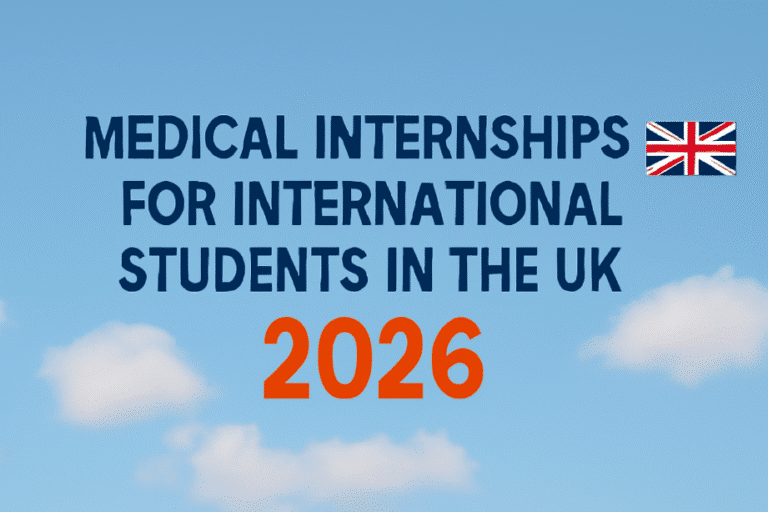
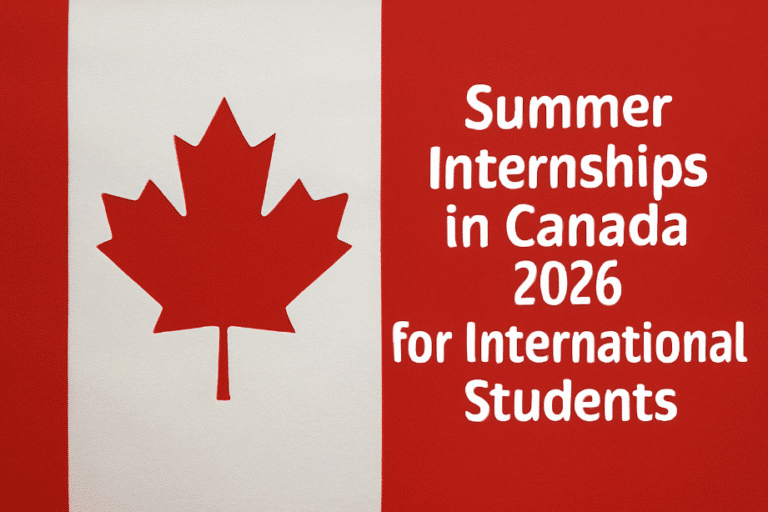
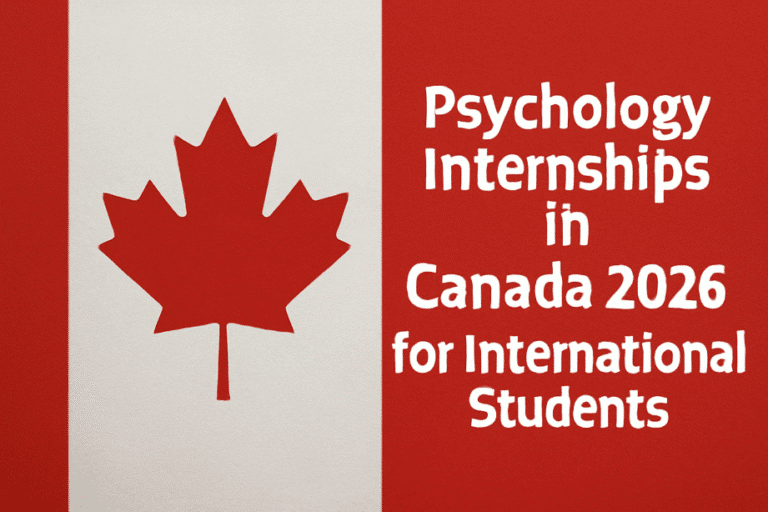
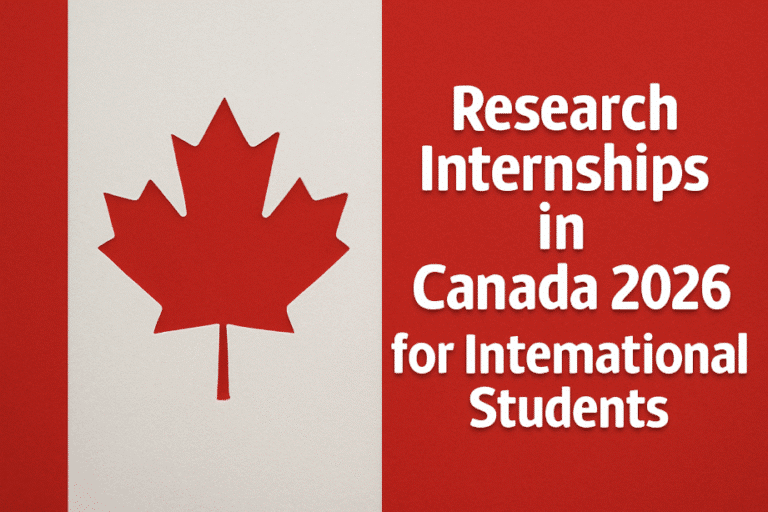
One Comment